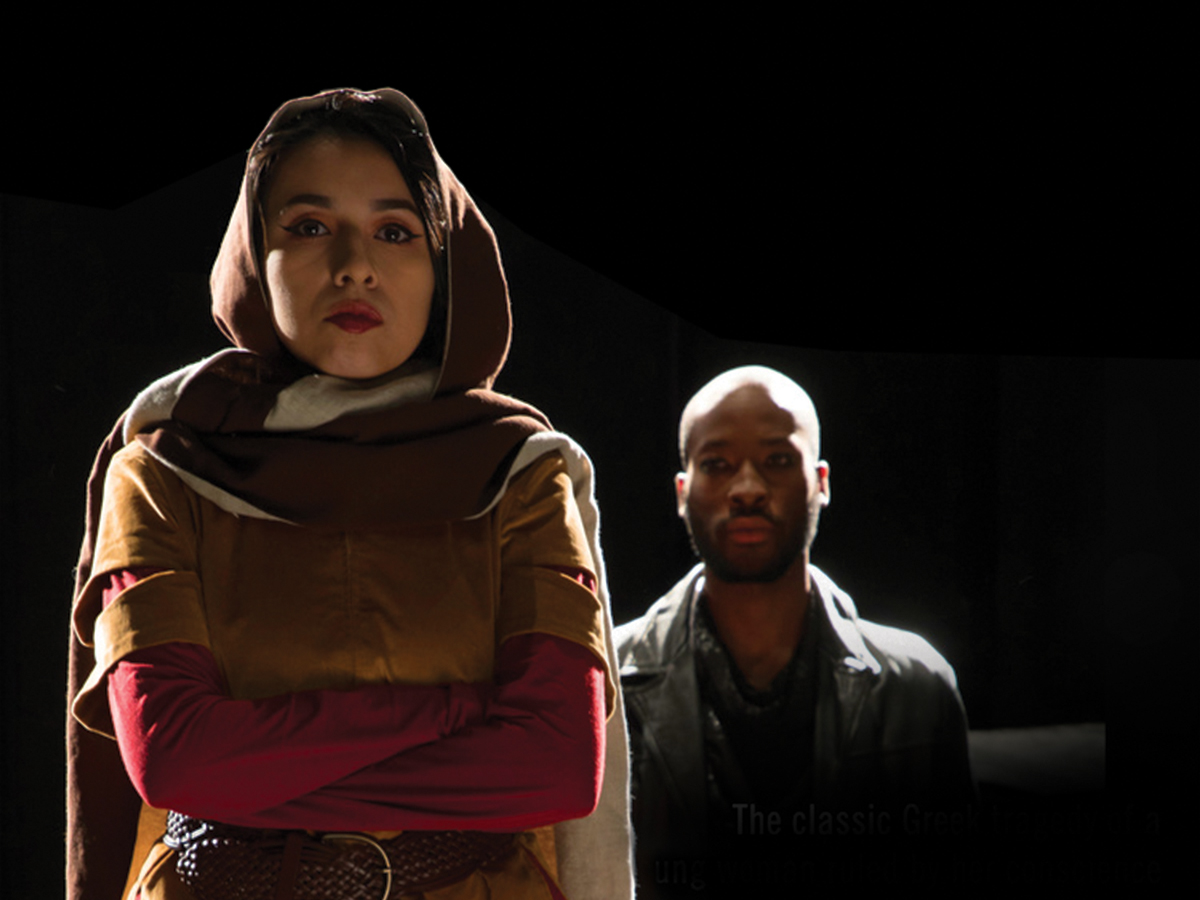
In Sophocles’ “Antigone,” the titular character breaks the law when she decides to give her brother — who was killed in battle — a proper burial. Creon, the ruler of Thebes, sentences her to death for defying him, claiming “Simple obedience saves the lives of hundreds of honest folk.”
“But when do those laws cease to protect?” is a question that Bella Merlin asks. Merlin is the director of UCR’s production of “Antigone,” a winter production which was sponsored by the UCR Department of Theatre, Film and Digital Production (TFDP) and ran from Feb. 15 through Feb. 24.
The pre-production phase of “Antigone” was a several month-long process that began in late September of 2017, but it was a cohesive coordination between Merlin, set designer Haibo Yu and costume designer Jason Estala. From the moment Merlin learned in May that she would be directing an adaptation of “Antigone,” she knew she wanted it to be set in a post-apocalyptic world as a way to make it relevant to a “21st century diverse UCR student body.” By the end of August, she shared images of war zones in Iraq, Syria and Afghanistan to the designers, who would use the pictures as references when designing sets and outfits. Merlin’s pictures depicted deserted cities filled with rubble and grand buildings reduced to walls littered with bullet holes. Such details translated over to set designer Haibo Yu’s final design “to symbolize the conflict between brutality and civilization,” Yu explains.
During this time of pre-production, Merlin also collaborated with Estala on creating costumes that would blend ancient Greek style garbs with contemporary fashion to fit within Merlin’s vision. From this process, Estala came up with the “Mad Max” and “Hunger Games” aesthetic that is found in the costuming.
The post-apocalyptic setting extends past the costumes and set, as Merlin worked with both her husband and stepson, Miles and Max Anderson, to compose music for the production. Power metal songs were eventually used for the chorus, which were handed over to sound designer Katie Jost. In addition to incorporating pre-existing songs into the play, Jost worked with Merlin to create the pre-show announcement that shouted at the audience, “You are now in a war zone.” The sounds of loud explosions would open the first few minutes of the play, allowing the dark setting and accompanying tone to settle in. “I wanted the audience to be plunged into darkness,” Merlin explains, “I wanted people to experience that edginess that many people on the planet are experiencing everyday of their lives.”
It was this dark, gritty and violent vision that convinced Abel Valencia, a fourth-year TFDP major, to audition for “Antigone.” “Nearly all of the content I create as a filmmaker is horror and overall just dark material. My passion will always be on the other side of the camera, but there is something very fun and addictive about acting,” says Valencia. Valencia played one of the king’s guards and was in the Greek chorus. “It was a challenge to analyze the text and find ways to connect it to myself. I really had to imagine why these people say these things, act these ways” he continues.
For many actors, “Antigone” was their first experience being apart of a Greek tragedy. They analyzed their own lines, speeches and the Greek mythology references found in the text throughout the six weeks of rehearsal. “The first week of rehearsal began with us doing table reads wherein we would first speak the lines and then go back over the text to the parts that were confusing and needed clarification. We spent a large amount of time discussing the Greek mythology references and why exactly they were placed in the plot,” begins Cynthia Navarro, a second-year TFDP major who plays the lead character of Antigone, “If you don’t know what you’re saying, then you can’t act it.”
This is the first production by the Department of TFDP that Navarro has been a part of. “The experience was difficult because it was my first real attempt at acting, and the text is not something easily accessible,” she explains. Yet, the experience made her a better actress in a number of ways. Before the audition, Navarro had read the play and related to the main character. “I relate to her commitment and respect she has for her family and that she wants to honor them.” Antigone’s bravery is a trait that Navarro believes makes her relatable not just to herself as an actor filling the role, but to audiences as well. “She’s just a young girl, but she stands up against the king,” states Navarro.
The rehearsal process also necessitated an understanding of the text’s relevance as an exploration of obedience and defiance in today’s contemporary political atmosphere. On the first day of rehearsal, Merlin asked Syrian Ph.D. student Leen Kawas to share her experiences from living in a war zone — which included having family members at war with each other and finding dead people in the streets on a daily basis — with the cast.
“I was moved by (Kawas’) strength and resilience,” says Navarro. “I wanted to emulate that in Antigone, who is also a symbol of strength and resistance in the face of oppression and violence.”
Although “Antigone” finished its production, war and violence still fills the news. From that stems Merlin’s final question to the audience through the play, “Why is humanity so addicted to war and violence?”








